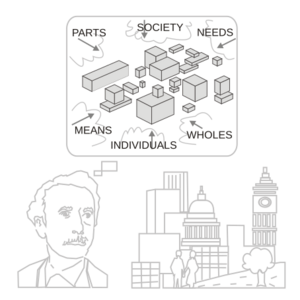Systems science facts for kids
Systems science is a special way of looking at the world. It studies how different parts work together as a whole, like a team. This field looks at systems everywhere, from nature and people to computers and machines. It helps us understand how things are connected.
Scientists who study systems believe that everything in the world is part of a bigger system. They want to find ideas that can be used in many different areas. This includes things like how our minds work (psychology), how living things work (biology), how we talk to each other (communication), and how businesses are run.
Systems science includes many interesting topics:
- Complex systems: These are systems with many parts that interact in surprising ways.
- Cybernetics: This is about how systems control themselves and communicate.
- Dynamical systems theory: This looks at how systems change over time.
- Information theory: This studies how information is measured and sent.
- Linguistics: This is the study of language.
- Systems theory: This is the main idea that systems are everywhere.
It also helps us in many real-world areas like:
- Control theory: How to make machines or processes do what we want.
- Systems design: How to plan and build new systems.
- Operations research: How to make decisions better using math.
- Systems biology: How living systems work together.
- System dynamics: How systems change and react over time.
- Computer science: How computers work and are built.
- Systems engineering: How to design and manage big projects.
Contents
Who Studies Systems?
Early Systems Thinkers
Many smart people have studied systems over the years. The first group of systems thinkers were born between 1900 and 1920. They came from different science fields. In the 1950s, they decided to work together. They wanted to create a new way of thinking called general systems theory.
Some of these early leaders were Ludwig von Bertalanffy, Kenneth Boulding, Ralph Gerard, and Anatol Rapoport. They helped make the idea of systems popular in the 1950s and 1960s.
New Generations of Scientists
These first scientists inspired a second group of thinkers. People like Ervin Laszlo and Fritjof Capra wrote a lot about systems in the 1970s and 1980s.
Later, a third group of scientists started studying these ideas. They began writing about systems in the 1990s. Debora Hammond is a good example of this newer generation of systems scientists.
Groups That Study Systems
International Society for the Systems Sciences
The International Society for the Systems Sciences (ISSS) is a group where people from different fields work together. They want to combine all the ideas from systems science. The ISSS is special because it brings together people from schools, businesses, and government. They have been doing amazing research for over fifty years.
This group was started in 1954. It was created by Ludwig von Bertalanffy, Kenneth Boulding, Ralph Gerard, and Anatol Rapoport.
International Federation for Systems Research
Another important group is the International Federation for Systems Research (IFSR). This group connects many smaller systems science groups around the world. It is a non-profit group that started in 1981. It has about thirty member groups from different countries.
The main goal of the IFSR is to help advance cybernetics and systems research. They also want to help apply these ideas in real life.
Santa Fe Institute
The Santa Fe Institute (SFI) is a very well-known research center. It is located in Santa Fe, New Mexico, in the United States. This institute is dedicated to studying complex systems.
SFI was founded in 1984 by several scientists. Many of them worked at the Los Alamos National Laboratory. Their first goal was to spread the idea of a new field called complexity science. This field studies how complex systems adapt and change.
Recently, IIT Jodhpur in India also started teaching system science and engineering. They offer programs for students to learn about system science. This makes it the first place in India to offer this kind of education.
 | Ernest Everett Just |
 | Mary Jackson |
 | Emmett Chappelle |
 | Marie Maynard Daly |


